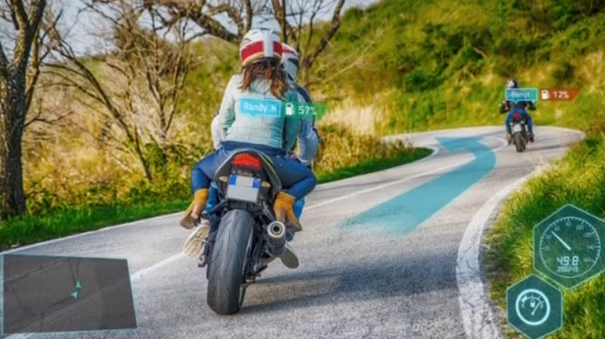TEL AVIV, Israel (Reuters) — A team of Israeli air force veterans have developed augmented reality ski goggles meant to enhance the experience of zipping down the slopes, letting users play games and navigate and potentially help them avoid hazards.
The developers tapped into their years of experience creating augmented reality visors for fighter pilots, along with their passion for outdoor sports, when they teamed up to form Israeli start up RideOn. The hi-tech goggles are already in the spotlight at the 2016 Olympics in Rio de Janeiro, having been chosen to participate in the Hype Foundation’s Global Sport Innovation Competition.
The technology could ultimately be embedded in other types of eyewear for various outdoor sports. A simple eye or head movement clicks on the icons displayed on the lenses. It can work both online, connected through a cellular phone, or off-line.
“We use our augmented reality technology and computer vision technology, we take low resolution video stream from the camera and we analyse the area and where you’re going to, where you’re skiing and where you’re looking at,” said Chief Executive Officer and co-founder Alon Getz from his offices in the bustling Tel Aviv start-up scene.
The device, attached to the temple of sports goggles, is a combination of off-the-shelf components, including an android based computer, a battery, an HD camera and a see-through display, which is all reincorporated and designed in Israel with RideOn’s technology software.
The device collects data from the mountain, for example your exact position, the weather, altitude, speed and the direction you looked and summarizes it all in a user-friendly display on the lens.
It can also post virtual objects and targets along the slope that you need to collect or pass through. Although it sounds distracting and potentially dangerous, none of this, the company says, interferes with the real world experience.
When connected to your mobile phone, the device allows users to interact with friends by sending preset text messages and calling them. Similar to the Waze navigation app, Getz says, it is also a social platform where users can navigate, post hazard warnings, seek help and advise other users of the best route in real-time.
With more than 400 units already in use on ski slopes around the world, Getz says they are collecting input from users.
“Some are saying we want to use it for gaming, we want to go through virtual gates, some say I want to know where my kid is and some say it’s for safety, so it’s all combined. Some say for navigation, understanding where you are with virtual maps overlaid on the real world,” said Getz.
Getz and his team hope their software, with its steady, accurate, see-through display of virtual objects in the real world, will be applied in all sorts of outdoor sports.
“It’s a social platform for skiing, for motorcycle riding, for light sports aviation, for everything. We are building an augmented reality operation system, so it can be used for all these applications,”.
Outdoor sports can pose a certain risk and augmented reality, Getz says, is yet another layer of danger for users.
“It is dangerous as Pokemon Go, for example, people standing and driving and stopping and getting Pokemons,” said Getz.
The Pokeman Go game exploded after its introduction last month, with players hitting the streets to capture colourful animated characters. Developed by Niantic and Pokemon Company, it marries a classic 20-year old franchise with augmented reality.
But Getz says their work in the air force back in the 1990s gives them an advantage over their competitors.
“We understand the danger so we know what to put in and what not to use as an augmented reality virtual objects,” he said. “For example, when you start skiing, most of the display will disappear, only when you get to an intersection you will see number eight to the right, number five to the left”.
RideOn’s project manager Tomer Cohen says the main goal of the eyewear is to get users off their computers and outside to have some fun.
“Just like Pokemon Go did and made people go around the city and interact with other people who use Pokemon Go, we intend to have social aspects in our product that will enable people to first go out and (then) have more fun,” said Cohen.
RideOn makers have raised more than $100,000 (USD) on an Indiegogo crowd funding campaign. Backers can now place pre orders for $630.









